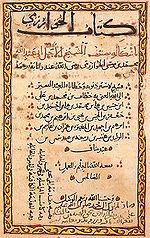
I was on Radio 3's Night Waves programme on Monday to chat with Jim al-Khalili about his new TV series Science and Islam (you can hear it here for the next few days). Jim is a physicist at the University of Surrey, trained in the western scientific tradition, but he was born in Baghdad. In the series, he explores the contribution of the Islamic world to the history of science. Are there Medieval Muslim scientists who should be spoken about in the same breath as Galileo, Newton or Einstein, he asks.
I've written here before about the influence of Islamic science and technology, and Jim is absolutely right that the achievements of these scholars are under-recognised today, in their home countries as well as the West. We're taught that once the ancient Greek and Roman civilisations fell, not much of importance happened in science until 1543, when Copernicus suggested that Earth orbits the Sun, and the anatomist Vesalius corrected longstanding misconceptions about the human body.
But during this time the Islamic world covered a vast kingdom that at its height stretched from Spain to northern India. Within this region, Muslims, Christians, pagans and Jews all worked together in the common language of Arabic. They had access to past knowledge from Greek, Egyptian, Persian, Indian and Chinese scholars, and starting in the eight century the Muslim rulers began a huge effort to translate, synthesise and disseminate this knowledge. It was a wonderful flowering of civilisation, openness and learning.
Much of the ancient knowledge that inspired European scientists in the 16th century reached them via Arabic translations, and for this alone western science owes a huge debt to its Islamic counterpart. And in many areas scientists working in the Islamic world improved significantly on the learning they inherited. Take the 13th-century astronomers of the Maragha school who developed mathematical techniques to describe the motions of the planets that were later used by Copernicus. Or the 9th-century Baghdad scholar al-Khwarizmi, who invented algebra (the picture shows a page from his book on the subject). In fact, pretty much any scientific word starting with "al" - such as alcohol, alkali, algorithm - probably comes from Arabic.
Jim's series is showing on BBC4, starting on 5 January. It's a joy to watch - beautifully shot and full of fascinating ideas, stories, people and places. I'm so pleased that he's drawing attention to this crucial chapter in the history of science. But while Jim emphasises the unprecedented feats of Islamic science, I would argue that the big achievement of this period was synthesis, not revolution.
The Maragha astronomers developed the maths to improve Ptolemy's models of planetary motion, for example, motivated by the idea that celestial orbits were divine and should involve only perfect circles. But for the most part they didn't attempt to make accurate astronomical observations and then explain what they saw. Chinese astronomers wrote detailed descriptions of the Crab Nebula, dramatically formed by a supernova in 1054. But scientists in the Islamic world barely mentioned it. And they never questioned the idea that the Earth was at the centre of the universe.
It was the Europeans, for whatever reason, who broke free of their dependence on ancient texts and finally made the leap to seeing knowledge as something to be gained by observing and experimenting on the natural world. Now science, not God, was the fundamental source of knowledge. That really was a revolution.